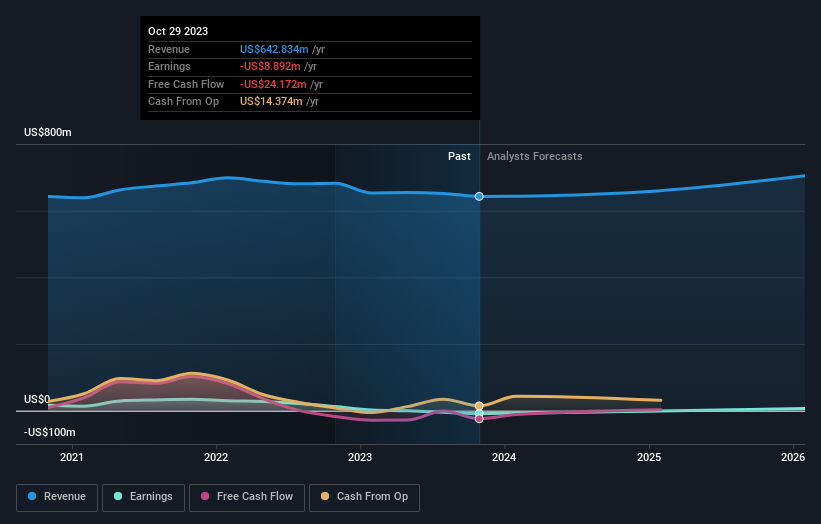With 37% ownership, Duluth Holdings Inc. (NASDAQ:DLTH) insiders have a lot riding on the company's future
Key Insights
Insiders appear to have a vested interest in Duluth Holdings' growth, as seen by their sizeable ownership
A total of 2 investors have a majority stake in the company with 56% ownership
If you want to know who really controls Duluth Holdings Inc. (NASDAQ:DLTH), then you'll have to look at the makeup of its share registry. With 37% stake, individual insiders possess the maximum shares in the company. That is, the group stands to benefit the most if the stock rises (or lose the most if there is a downturn).
So it follows, every decision made by insiders of Duluth Holdings regarding the company's future would be crucial to them.
Let's take a closer look to see what the different types of shareholders can tell us about Duluth Holdings.
View our latest analysis for Duluth Holdings
What Does The Institutional Ownership Tell Us About Duluth Holdings?
Institutional investors commonly compare their own returns to the returns of a commonly followed index. So they generally do consider buying larger companies that are included in the relevant benchmark index.
Duluth Holdings already has institutions on the share registry. Indeed, they own a respectable stake in the company. This suggests some credibility amongst professional investors. But we can't rely on that fact alone since institutions make bad investments sometimes, just like everyone does. If multiple institutions change their view on a stock at the same time, you could see the share price drop fast. It's therefore worth looking at Duluth Holdings' earnings history below. Of course, the future is what really matters.
Duluth Holdings is not owned by hedge funds. Our data suggests that Stephen Schlecht, who is also the company's Top Key Executive, holds the most number of shares at 31%. When an insider holds a sizeable amount of a company's stock, investors consider it as a positive sign because it suggests that insiders are willing to have their wealth tied up in the future of the company. Meanwhile, the second and third largest shareholders, hold 25% and 3.3%, of the shares outstanding, respectively. In addition, we found that Samuel Sato, the CEO has 1.8% of the shares allocated to their name.
After doing some more digging, we found that the top 2 shareholders collectively control more than half of the company's shares, implying that they have considerable power to influence the company's decisions.
While it makes sense to study institutional ownership data for a company, it also makes sense to study analyst sentiments to know which way the wind is blowing. There are plenty of analysts covering the stock, so it might be worth seeing what they are forecasting, too.
Insider Ownership Of Duluth Holdings
While the precise definition of an insider can be subjective, almost everyone considers board members to be insiders. Company management run the business, but the CEO will answer to the board, even if he or she is a member of it.
I generally consider insider ownership to be a good thing. However, on some occasions it makes it more difficult for other shareholders to hold the board accountable for decisions.
It seems insiders own a significant proportion of Duluth Holdings Inc.. It has a market capitalization of just US$164m, and insiders have US$60m worth of shares in their own names. This may suggest that the founders still own a lot of shares. You can click here to see if they have been buying or selling.
General Public Ownership
The general public, who are usually individual investors, hold a 16% stake in Duluth Holdings. This size of ownership, while considerable, may not be enough to change company policy if the decision is not in sync with other large shareholders.
Private Company Ownership
It seems that Private Companies own 25%, of the Duluth Holdings stock. It might be worth looking deeper into this. If related parties, such as insiders, have an interest in one of these private companies, that should be disclosed in the annual report. Private companies may also have a strategic interest in the company.
Next Steps:
It's always worth thinking about the different groups who own shares in a company. But to understand Duluth Holdings better, we need to consider many other factors. To that end, you should be aware of the 1 warning sign we've spotted with Duluth Holdings .
Ultimately the future is most important. You can access this free report on analyst forecasts for the company.
NB: Figures in this article are calculated using data from the last twelve months, which refer to the 12-month period ending on the last date of the month the financial statement is dated. This may not be consistent with full year annual report figures.
Have feedback on this article? Concerned about the content? Get in touch with us directly. Alternatively, email editorial-team (at) simplywallst.com.
This article by Simply Wall St is general in nature. We provide commentary based on historical data and analyst forecasts only using an unbiased methodology and our articles are not intended to be financial advice. It does not constitute a recommendation to buy or sell any stock, and does not take account of your objectives, or your financial situation. We aim to bring you long-term focused analysis driven by fundamental data. Note that our analysis may not factor in the latest price-sensitive company announcements or qualitative material. Simply Wall St has no position in any stocks mentioned.


